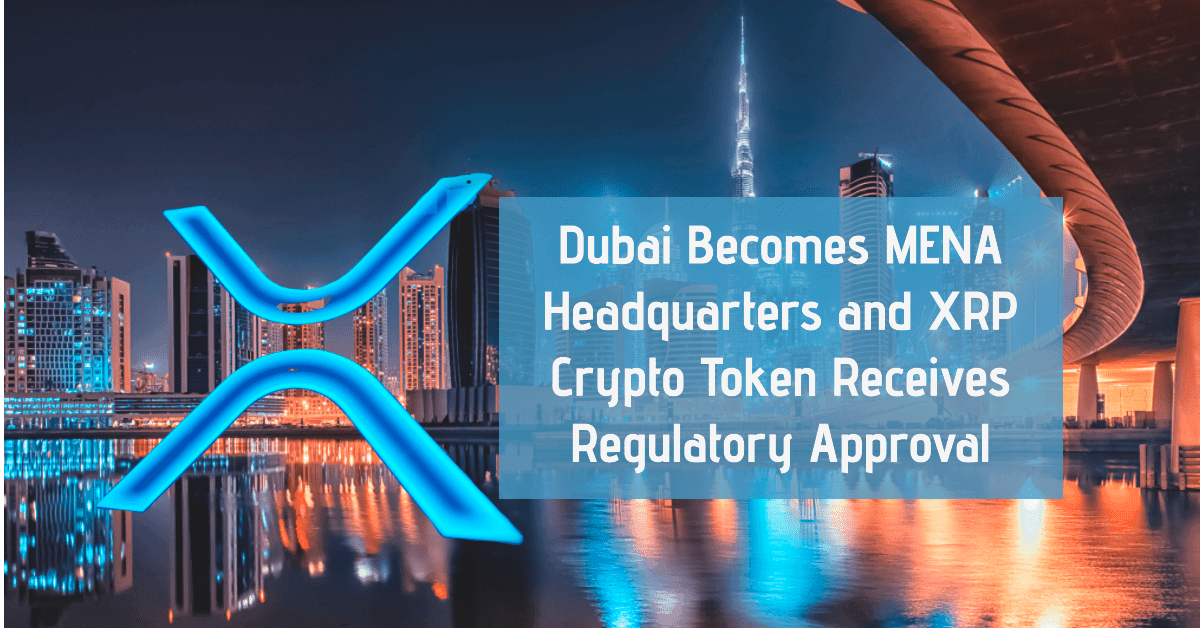Dubai, known for its progressive approach to innovation, has taken another step towards becoming a leading global financial centre for cryptocurrency. The Dubai Financial Services Authority (DFSA) has recently approved XRP, the digital asset associated with Ripple, as a recognized crypto token for use within the Dubai International Financial Centre (DIFC).
This landmark decision will pave the way for faster and more efficient global value exchange within the region. Let’s dig deeper.
XRP Joins the List of Recognized Crypto Tokens

The DFSA, the financial regulatory agency of the DIFC, granted its official approval for XRP’s use within the centre. Licensed virtual asset firms operating within the DIFC can now incorporate XRP into their range of virtual asset services. This approval signifies a significant milestone for XRP, as it becomes the first virtual asset to be approved under the DFSA’s regulatory regime since the opening of external applications.
In a recent notice, the DFSA announced the addition of XRP and toncoin (TON) to its list of “Recognized Crypto Tokens.” This list now includes five cryptocurrencies: bitcoin (BTC), ether (ETH), litecoin (LTC), toncoin (TON), and XRP. The recognition of XRP and TON came into effect on November 2, 2023, while BTC, ETH, and LTC were added on November 1, 2022.
Benefits of XRP’s Approval in the DIFC
With XRP’s recognition by the DFSA, institutions located in the DIFC can now leverage the benefits of XRP for faster and more efficient global value exchange. This approval brings legal and regulatory clarity to XRP within the DIFC, creating an environment conducive to its widespread use. The integration of XRP into virtual asset services offered by licensed firms within the DIFC will significantly enhance the speed and efficiency of cross-border transactions.
Ripple’s Choice of Dubai as MENA Headquarters

Ripple’s decision to establish its Middle East and North Africa (MENA) headquarters in the Dubai International Financial Centre (DIFC) in 2020 speaks volumes about the city’s appeal as a crypto hub. Dubai’s forward-thinking approach to regulations, coupled with its extensive network and reputation as a global financial centre, made it an ideal choice for Ripple.
The DIFC is a special economic zone that offers a favourable business environment for companies operating in the financial sector. It provides a robust regulatory framework, sophisticated infrastructure, and access to a wide range of financial institutions. These factors, combined with Dubai’s strategic location as a gateway between East and West, have attracted numerous international businesses to set up operations within the DIFC.
Ripple recognised the potential of the MENA region in the cryptocurrency space, with approximately 20% of its customer base located in this area. By establishing its headquarters in Dubai, Ripple aims to strengthen its presence in the region and leverage the city’s innovative ecosystem to drive the adoption of blockchain technology and digital assets.
Dubai’s Regulatory Environment for Virtual Assets

Dubai is committed to fostering a supportive regulatory environment for virtual assets and has established regulatory bodies to oversee this emerging sector. Alongside the Dubai Financial Services Authority (DFSA), which regulates the DIFC, the city has the Virtual Assets Regulatory Authority (VARA) to oversee and regulate crypto assets and activities across various zones within Dubai, excluding the DIFC.
VARA’s role is to ensure that crypto assets and related activities comply with regulatory standards and promote investor protection. By working with the DFSA, Dubai aims to provide regulatory clarity and guidance to licensed firms offering virtual asset services. This collaborative approach helps create a well-defined and secure environment for businesses and investors engaging in virtual asset activities in Dubai.
The DFSA and VARA work together to establish comprehensive regulations, monitor market participants, and enforce compliance. Their efforts aim to strike a balance between promoting innovation and safeguarding investors’ interests and the financial system’s integrity. By providing clear guidelines and regulatory oversight, Dubai positions itself as a jurisdiction that welcomes responsible innovation in the virtual asset space.
Ripple’s Commitment to Dubai’s Crypto Potential

Ripple’s CEO, Brad Garlinghouse, expressed his enthusiasm for the Dubai Financial Services Authority’s approval of XRP as a recognised crypto token within the DIFC. He emphasised Ripple’s commitment to expanding its presence in Dubai and working closely with regulators to unlock the full potential of cryptocurrencies in the city.
Garlinghouse praised the UAE’s dedication to offering regulatory clarity and guidance, which positions it as one of the most innovative jurisdictions for licensed firms in the virtual asset space. He acknowledged Dubai’s forward-thinking approach and the city’s role in shaping the future of the cryptocurrency industry.
Ripple’s commitment to Dubai goes beyond establishing its MENA headquarters. The company aims to collaborate closely with regulators, financial institutions, and other stakeholders to drive the adoption of blockchain technology and digital assets in the region. By leveraging Dubai’s supportive ecosystem and regulatory framework, Ripple aims to contribute to the growth and development of the crypto industry in the city and beyond.
Conclusion
In conclusion, the Dubai Financial Services Authority’s recognition of XRP as a crypto token for use within the DIFC marks a significant milestone for both Ripple and the cryptocurrency industry in Dubai. This approval brings legal and regulatory clarity, enabling licensed firms to leverage XRP’s capabilities for faster and more efficient global value exchange. With Dubai’s innovation-forward regulations, the city is rapidly establishing itself as a leading global financial centre for cryptocurrencies.







